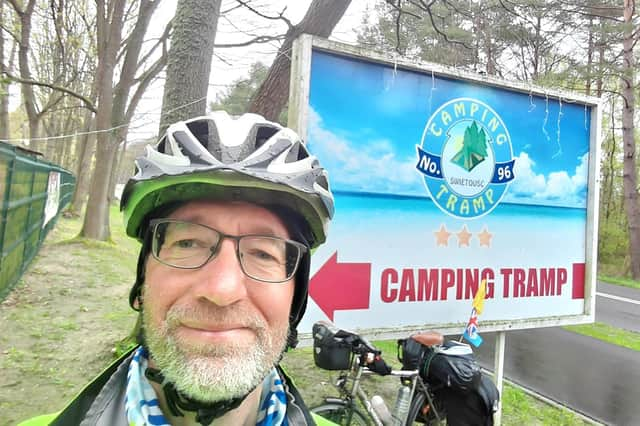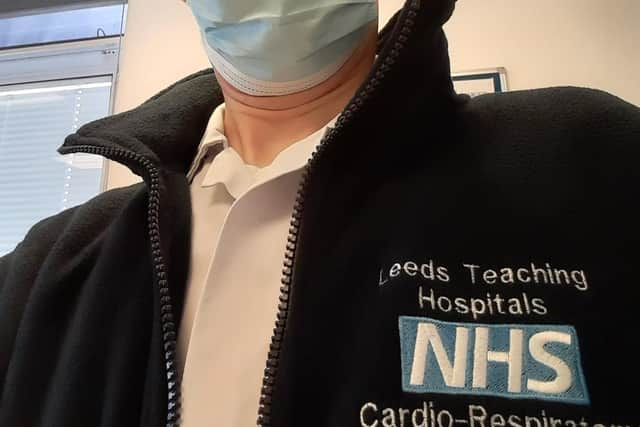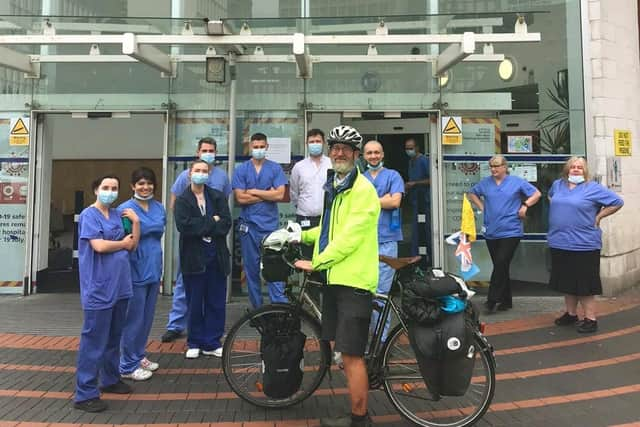Halifax resident cycles for three months across Europe in support of hospital where he works which saved his life 25 years ago


It’s fair to say he’d missed his home comforts whilst camping and riding on the continent - “it’s so nice to open a drawer full of clean socks and undies in a morning,” he jokes - but the 5,000-mile feat was a chance for Nick to make a difference to the two organisations which “got me to 50”, a personal celebration of the milestone, whilst raising funds for causes dear to his heart.
It was an opportunity, too, to take some time away from the National Health Service, where he works as an associate practitioner in cardio-respiratory, after more than two years of supporting patients during a global pandemic.
Advertisement
Hide AdAdvertisement
Hide Ad“I wanted to do something to celebrate being alive at 50,” Nick says. “It’s something you take for granted but I didn’t get here naturally, I’m here because of a brilliant team of surgeons and staff in the NHS.”


He’s referring there to his own medical journey, which led him to swap his career in financial services for one in healthcare. He was 25 when he went to his GP to find the cause of his increasing deafness - perhaps a build up of wax in his ear canal, he thought.
Tuning fork, audiogram and MRI scan later, Halifax-born Nick was diagnosed with a brain tumour - one so big that it was deforming his brainstem and leaving surgery as the only option for treatment. He wasn’t convinced of a positive outcome.
“I thought the worst they would tell me is I’m going deaf,” he recalls. “I’d prepared myself for that. I walked into the consulting room and with the actual diagnosis, I was in shock. They showed me the MRI and I said that’s not mine, I genuinely said that.”
Advertisement
Hide AdAdvertisement
Hide AdAn avid cyclist, who had completed Lands End to John O’ Groats in 1996, Nick says it was surprising that he didn’t feel confident on his bicycle during 1997. Then, when he failed to hear a car pass him by on a ride one evening that year, he decided to seek medical attention.


“That’s what prompted me to go to my GP and say I don’t think I can hear very well. It was that frightening enough for me to go there’s something wrong here.”
Nick was diagnosed with an acoustic neuroma tumour, a benign growth in the brain on the nerve used for hearing and balance. He underwent surgery at LGI. “There is no doubt that the physical health I enjoy despite the loss of hearing and balance are as a result of the care received at LGI,” he says. “I wouldn’t be here in the state I’m in now without having such a good surgeon who said I can do this.”
His 50th birthday seemed a fitting moment to raise funds for the neurosurgery ward L25 at the hospital in an expression of gratitude. Nick, who lives in Bradford, also wanted to support the British Acoustic Neuroma Association, which has helped him with knowledge and advice about the condition.
Advertisement
Hide AdAdvertisement
Hide Ad“They’re the only people who are really the experts in this,” he says. “It’s through them we get better treatment for all patients diagnosed. As for ward L25, I’m really grateful for not only what they did for me but what they do for all patients.”
Nick, whose hearing and balance remain affected, decided to cycle the Eurovelo 10 route, taking in countries such as Germany, Poland, Lithuania, Latvia, Estonia, Finland, Sweden and Denmark. He took a ferry over to the Netherlands to begin his journey on his 50th birthday in April. His faithful bike got him through, the affectionately named Tiger.
“My first touring bike - Tiger one - would run away with itself downhill and I’m not very good with fast speeds because my balance can’t cope with it,” Nick says. “So I would say easy tiger and now all my touring bikes will forever be called Tiger.”
Nick returned to LGI on July 29, having cycled in climates varying from -2 to 38 degrees Celsius. The hospital, which he credits with saving his life, has been his workplace for the past three years.
Advertisement
Hide AdAdvertisement
Hide Ad“After my surgery, I wanted to do something that makes a difference and that’s how I ended up being in the NHS,” he says. “I’d been through the system myself and everyone was doing such a great job.”
He began his career in healthcare as a care assistant in a private nursing home, before becoming a trainee healthcare assistant at St Luke’s Hospital in Bradford, where he then trained as a cardiographer and went on to spend time in cardiology at Harrogate and Airedale hospitals before joining the team in Leeds. He’d not been there long before the Covid pandemic took hold.
“When I go see patients, I always like to treat them as if it was me. But the more PPE you put on, the more you feel like a spaceman walking into a room,” Nick says. “The situation brought home how much NHS staff all look after each other. The team ethics were amazing.
“The worst of it was, and I’ll always think about this, was when you saw visitors on the ward because that meant a patient didn’t have a very good outcome. That was heartbreaking - you’d see visitors going on the wards and getting dressed up [in PPE] for their last chance to spend time with a loved one. At the end of somebody’s life, you would like to think they can all sit and hold hands somewhere in peace and quiet, not all be covered in gloves, masks and aprons. And obviously for some people they didn’t get a chance to say goodbye.”
Advertisement
Hide AdAdvertisement
Hide AdThe cycling challenge gave Nick time to reflect not only on his own health, but on the challenges of the past two years. “Prior to Covid, I’d wear a [medical] hood if I went to see someone with active TB, which is quite rare. During Covid, every patient was treated as though they had an infectious disease,” Nick says. “One of the other factors for doing this was to get away from aprons, masks and gowns.”
Reflecting on the trip, he adds: “At my five year discharge post-surgery, I asked can I ride a bike again? And I remember the intake of breath followed by, ‘well you can try, be careful’. There’s nothing nicer than thinking I’m going to try and get good at this - and I think I’ve got good at that.
“Cycling was something I enjoyed doing prior to surgery that has meant so much more to me afterwards because of the thought of maybe never being able to do it again…I’m never going to be an elite cyclist. But it’s not about that.
“Alright my body doesn’t do this, this and this, I can’t go fast downhill, I can’t take corners at speed because I’ll feel unsteady and fall off but that doesn’t mean within my limitations I can’t do amazing things and I’ve demonstrated that over the past three months.
Advertisement
Hide AdAdvertisement
Hide Ad“Yes I’ve come off the bike a few times, yes it hurts and it happens but I’ve still got up and thought I’m keeping going. Every time I get on a bike I feel very fortunate, very lucky.”
To support him, visit www.justgiving.com/team/EuroVelo10.